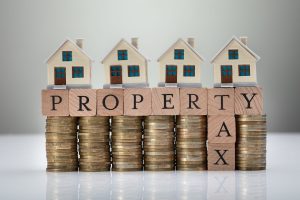
Dreaming of a comfortable retirement? Property investment might be the key to unlocking your financial freedom in your golden years.
In this comprehensive guide, we’ll walk you through the process of building a successful investment property portfolio and discuss “how many investment properties to retire comfortably”. This can provide you with a steady income stream during retirement.
Key Takeaways
- Determine retirement goals and evaluate the financial situation before investing in property.
- Consider rental income, location, market conditions, and investment strategy to maximize returns.
- Seek professional advice for successful property investment strategies that balance risk & reward.
Determining Your Retirement Goals

A general guideline for estimating how many properties are needed for investment properties retirement is to possess as many properties as required to reach approximately $1 million of unencumbered property for every $25,000 of net income you wish to obtain, in addition to having your home paid off in full.
However, climbing the property investment ladder isn’t without its restrictions. Owning multiple properties while still having outstanding loans from the first property can pose a significant financial burden in the short-term, potentially depleting savings. It’s essential to carefully consider your financial situation and investment strategy before diving into the world of property investment.
Evaluating Your Current Financial Situation
Before you start buying investment properties, it’s crucial to evaluate your current financial situation. Factors such as income, expenses, assets, and liabilities will play a significant role in determining your capacity for property investment and potential growth. Lending for investment properties has changed in recent years, with lenders no longer providing 110% loans. Banks now require a minimum down payment of 20% for additional residences. Lenders also assess rental income for loan approval by reviewing tax returns and depreciation. If the property was recently purchased and is not reflected on the tax returns, only 75% of the rental income is taken into consideration.
If you’re considering investing in multiple properties, it’s important to be aware of the minimum credit score requirements for conventional loans. For individuals with fewer than seven financed properties, the minimum credit score is 620, while borrowers with seven to ten financed properties must possess a minimum credit score of 720. Understanding these requirements will help you better navigate the financial landscape when it comes to property investment.
The Role of Rental Income in Retirement Planning

The long-term average gross rental income in Australian capital cities for the majority of properties is approximately 4% of their value. However, achieving a desirable rental yield (typically between 4-6%) will depend on factors such as the property’s location, proximity to amenities, and the desired demographic of tenants.
While rental income can provide a consistent passive income during retirement, it is difficult for the average person to replace their entire income with rental income alone. It’s essential to develop a well-rounded investment strategy that includes other assets, such as shares, to ensure a comfortable retirement lifestyle.

Factors Influencing Investment Property Success

Additionally, the property type and investment strategy can significantly influence the property’s potential for rental income and capital growth. Market conditions can also play a significant role in the value of
your investment property, making it important to stay informed about local and national market trends, especially when considering high growth properties or investment grade properties.
Furthermore, ensuring proper tenant care and property maintenance is essential for guaranteeing your property remains a valuable asset.
Building a Diversified Property Portfolio

- Investing in emerging suburbs with strong rental growth
- Exploring market opportunities with sellers requiring quick cash
- Diversifying across various price points
By implementing these strategies, you can increase the stability and profitability of your property investments.
Geographical diversification can also help balance returns and asset value growth, ensuring that your property investments remain profitable and secure. Selecting the right investment areas is crucial for building a successful property portfolio. An advisor can be invaluable in guiding you toward promising locations and property types that align with your investment strategy.
Balancing Risk and Reward in Property Investment

Understanding the potential impact of selling an investment property after retirement on Age Pension entitlements is crucial for avoiding unintended consequences. It’s important to consult with a certified accountant and real estate lawyer to evaluate your individual circumstances and make the best decision
for your financial future.
Engaging with professional advisors, such as financial planners, mortgage brokers, and property managers, can help you navigate the complexities of property investment and ensure you’re on track to achieve your retirement goals.
Tax Considerations for Property Investors

- Deductions
- Capital gains tax
- Negative gearing
- Depreciation, which can be used to offset income and provide a significant tax benefit for property investors.
However, interest payments on a loan taken out for living expenses in retirement are not eligible for tax deductions. High-income earners are likely to experience the greatest advantages from a negatively geared property. It’s essential to consult with a tax professional to determine the best strategy for your individual circumstances.
The Role of Professional Advice in Property Investment

When selecting professional advisors, it’s important to choose independent and unbiased professionals, not salespeople, to ensure you receive the best advice for your individual needs.
In addition to receiving professional advice, participating in mentorship programs, such as the “10 properties in 10 years formula and strategy presentation,” can provide tailored investment strategies and insights from successful property investors.
Other strategies for boosting property investment growth include:
- Utilizing non-bank lenders to maximize borrowing power
- Diversifying loan providers
- Taking advantage of interest-only loans to reduce payments and capitalize on tax deductions.
Summary
In conclusion, building a successful investment property portfolio for retirement requires careful planning, diligent research, and professional guidance. By setting clear retirement goals, evaluating your financial situation, and implementing strategies to accelerate growth, you can achieve financial freedom and enjoy a comfortable retirement. Now it’s time to take action and embark on your property investment journey.
Frequently Asked Questions

How many investment properties do you need to retire Australia?
Increasing your rental property portfolio up to five or more homes can make retirement even more secure.
How many Australians own 3 properties?
Is 2 million invested enough to retire?
How many investment properties can a person own?
What factors should I consider when evaluating my financial situation for property investment?
These factors will help you determine how much you can afford to invest and how much potential growth you can expect. Additionally, you should consider the current market conditions and the potential risks associated with investing in property.
Researching the local area.












